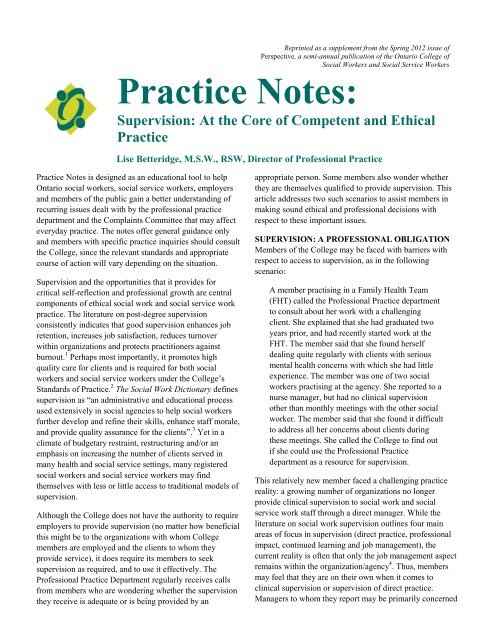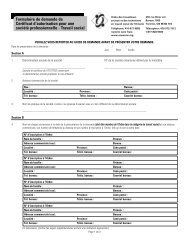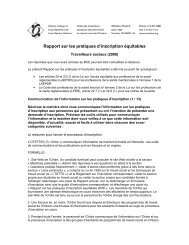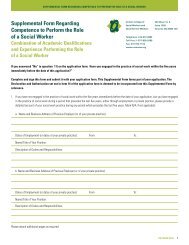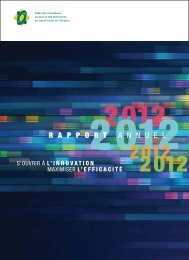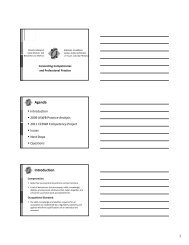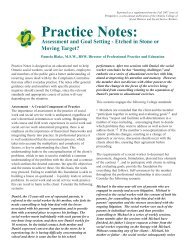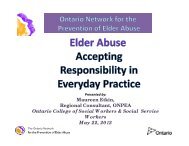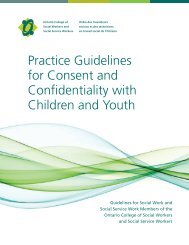Supervision - Ontario College of Social Workers and Social Service ...
Supervision - Ontario College of Social Workers and Social Service ...
Supervision - Ontario College of Social Workers and Social Service ...
You also want an ePaper? Increase the reach of your titles
YUMPU automatically turns print PDFs into web optimized ePapers that Google loves.
Reprinted as a supplement from the Spring 2012 issue <strong>of</strong><br />
Perspective, a semi-annual publication <strong>of</strong> the <strong>Ontario</strong> <strong>College</strong> <strong>of</strong><br />
<strong>Social</strong> <strong>Workers</strong> <strong>and</strong> <strong>Social</strong> <strong>Service</strong> <strong>Workers</strong><br />
Practice Notes:<br />
<strong>Supervision</strong>: At the Core <strong>of</strong> Competent <strong>and</strong> Ethical<br />
Practice<br />
Lise Betteridge, M.S.W., RSW, Director <strong>of</strong> Pr<strong>of</strong>essional Practice<br />
Practice Notes is designed as an educational tool to help<br />
<strong>Ontario</strong> social workers, social service workers, employers<br />
<strong>and</strong> members <strong>of</strong> the public gain a better underst<strong>and</strong>ing <strong>of</strong><br />
recurring issues dealt with by the pr<strong>of</strong>essional practice<br />
department <strong>and</strong> the Complaints Committee that may affect<br />
everyday practice. The notes <strong>of</strong>fer general guidance only<br />
<strong>and</strong> members with specific practice inquiries should consult<br />
the <strong>College</strong>, since the relevant st<strong>and</strong>ards <strong>and</strong> appropriate<br />
course <strong>of</strong> action will vary depending on the situation.<br />
<strong>Supervision</strong> <strong>and</strong> the opportunities that it provides for<br />
critical self-reflection <strong>and</strong> pr<strong>of</strong>essional growth are central<br />
components <strong>of</strong> ethical social work <strong>and</strong> social service work<br />
practice. The literature on post-degree supervision<br />
consistently indicates that good supervision enhances job<br />
retention, increases job satisfaction, reduces turnover<br />
within organizations <strong>and</strong> protects practitioners against<br />
burnout. 1 Perhaps most importantly, it promotes high<br />
quality care for clients <strong>and</strong> is required for both social<br />
workers <strong>and</strong> social service workers under the <strong>College</strong>’s<br />
St<strong>and</strong>ards <strong>of</strong> Practice. 2 The <strong>Social</strong> Work Dictionary defines<br />
supervision as “an administrative <strong>and</strong> educational process<br />
used extensively in social agencies to help social workers<br />
further develop <strong>and</strong> refine their skills, enhance staff morale,<br />
<strong>and</strong> provide quality assurance for the clients”. 3 Yet in a<br />
climate <strong>of</strong> budgetary restraint, restructuring <strong>and</strong>/or an<br />
emphasis on increasing the number <strong>of</strong> clients served in<br />
many health <strong>and</strong> social service settings, many registered<br />
social workers <strong>and</strong> social service workers may find<br />
themselves with less or little access to traditional models <strong>of</strong><br />
supervision.<br />
Although the <strong>College</strong> does not have the authority to require<br />
employers to provide supervision (no matter how beneficial<br />
this might be to the organizations with whom <strong>College</strong><br />
members are employed <strong>and</strong> the clients to whom they<br />
provide service), it does require its members to seek<br />
supervision as required, <strong>and</strong> to use it effectively. The<br />
Pr<strong>of</strong>essional Practice Department regularly receives calls<br />
from members who are wondering whether the supervision<br />
they receive is adequate or is being provided by an<br />
appropriate person. Some members also wonder whether<br />
they are themselves qualified to provide supervision. This<br />
article addresses two such scenarios to assist members in<br />
making sound ethical <strong>and</strong> pr<strong>of</strong>essional decisions with<br />
respect to these important issues.<br />
SUPERVISION: A PROFESSIONAL OBLIGATION<br />
Members <strong>of</strong> the <strong>College</strong> may be faced with barriers with<br />
respect to access to supervision, as in the following<br />
scenario:<br />
A member practising in a Family Health Team<br />
(FHT) called the Pr<strong>of</strong>essional Practice department<br />
to consult about her work with a challenging<br />
client. She explained that she had graduated two<br />
years prior, <strong>and</strong> had recently started work at the<br />
FHT. The member said that she found herself<br />
dealing quite regularly with clients with serious<br />
mental health concerns with which she had little<br />
experience. The member was one <strong>of</strong> two social<br />
workers practising at the agency. She reported to a<br />
nurse manager, but had no clinical supervision<br />
other than monthly meetings with the other social<br />
worker. The member said that she found it difficult<br />
to address all her concerns about clients during<br />
these meetings. She called the <strong>College</strong> to find out<br />
if she could use the Pr<strong>of</strong>essional Practice<br />
department as a resource for supervision.<br />
This relatively new member faced a challenging practice<br />
reality: a growing number <strong>of</strong> organizations no longer<br />
provide clinical supervision to social work <strong>and</strong> social<br />
service work staff through a direct manager. While the<br />
literature on social work supervision outlines four main<br />
areas <strong>of</strong> focus in supervision (direct practice, pr<strong>of</strong>essional<br />
impact, continued learning <strong>and</strong> job management), the<br />
current reality is <strong>of</strong>ten that only the job management aspect<br />
remains within the organization/agency 4 . Thus, members<br />
may feel that they are on their own when it comes to<br />
clinical supervision or supervision <strong>of</strong> direct practice.<br />
Managers to whom they report may be primarily concerned
with instrumental aspects <strong>of</strong> the job (including recordkeeping,<br />
accreditation, organizational policies, m<strong>and</strong>ate <strong>and</strong><br />
caseload) as opposed to the clinically complex issues<br />
associated with assessment, intervention <strong>and</strong> evaluation <strong>of</strong><br />
client interventions <strong>and</strong> the critical self-reflection which<br />
should accompany such work. Furthermore, activities<br />
related to assisting clients to navigate systems, <strong>and</strong><br />
influencing those systems <strong>and</strong> advocating on clients’ behalf<br />
do not generally form part <strong>of</strong> this kind <strong>of</strong> supervision.<br />
As the regulatory body for social workers <strong>and</strong> social<br />
service workers in <strong>Ontario</strong>, the <strong>College</strong> does not have<br />
authority over employers. Thus, the <strong>College</strong> cannot require<br />
employers to provide supervision to its staff who are<br />
registered with the <strong>College</strong>, nor can it determine who<br />
should supervise social work or social service work staff.<br />
The Code <strong>of</strong> Ethics <strong>and</strong> St<strong>and</strong>ards <strong>of</strong> Practice H<strong>and</strong>book,<br />
2 nd Edition sets out the minimum st<strong>and</strong>ards <strong>of</strong> practice for<br />
members <strong>and</strong> provides some guidance in the area <strong>of</strong><br />
supervision. According to the st<strong>and</strong>ards, it is up to each<br />
member <strong>of</strong> the <strong>College</strong> to ensure that “(as) part <strong>of</strong><br />
maintaining competence <strong>and</strong> acquiring skills in social work<br />
or social service work practice ... (they) engage in the<br />
process <strong>of</strong> self review <strong>and</strong> evaluation <strong>of</strong> their practice <strong>and</strong><br />
seek consultation when appropriate.” 5 Members must also<br />
be “aware <strong>of</strong> the extent <strong>and</strong> parameters <strong>of</strong> their competence<br />
<strong>and</strong> their pr<strong>of</strong>essional scope <strong>of</strong> practice <strong>and</strong> limit their<br />
practice accordingly.” 6 When, as in the scenario described<br />
above, the client’s needs fall outside the member’s usual<br />
area <strong>of</strong> practice, the member should inform the client <strong>of</strong><br />
this <strong>and</strong> <strong>of</strong>fer to make an appropriate referral. If the client<br />
wishes to continue with the member, the member may<br />
continue to work with the client, providing that she<br />
“ensure(s) that the services… she provides are competently<br />
provided by seeking additional supervision, consultation<br />
<strong>and</strong>/or education”. 7<br />
In this scenario, the member recognized that without<br />
supervision, she could not provide appropriate <strong>and</strong><br />
competent care for certain <strong>of</strong> her clients. Given her relative<br />
lack <strong>of</strong> experience in the pr<strong>of</strong>ession, this is not surprising.<br />
While the st<strong>and</strong>ards do not set out specific requirements<br />
regarding the frequency <strong>of</strong> supervision for members at<br />
different stages <strong>of</strong> their career, less experienced members<br />
may wish to arrange more frequent, structured <strong>and</strong> regular<br />
supervision as they develop their knowledge <strong>and</strong> skills <strong>and</strong><br />
gain experience. However, even the most experienced<br />
member may encounter client situations that are<br />
challenging or outside their area <strong>of</strong> experience <strong>and</strong><br />
competence, <strong>and</strong> all members must seek supervision or<br />
consultation in these circumstances.<br />
Although it may be ideal for supervision to be provided by<br />
another member <strong>of</strong> one’s pr<strong>of</strong>ession, this arrangement is<br />
not always possible <strong>and</strong> is not required by the st<strong>and</strong>ards.<br />
Members should consider whether the supervisor in<br />
question has relevant expertise, experience in their area <strong>of</strong><br />
practice <strong>and</strong>/or setting, <strong>and</strong> an underst<strong>and</strong>ing <strong>of</strong> the<br />
pr<strong>of</strong>ession’s values, ethics <strong>and</strong> st<strong>and</strong>ards <strong>of</strong> practice. If a<br />
member is being supervised by someone outside their<br />
pr<strong>of</strong>ession, are there gaps or differences in perspective that<br />
could be addressed by seeking additional input, either<br />
through peers or outside the agency In these<br />
circumstances, it may be necessary for members to be<br />
creative in obtaining the pr<strong>of</strong>ession-specific supervision<br />
that they need.<br />
While <strong>College</strong> members are encouraged to call the<br />
Pr<strong>of</strong>essional Practice Department to discuss ethical <strong>and</strong><br />
practice dilemmas, the focus <strong>of</strong> these calls is to identify<br />
relevant st<strong>and</strong>ards, to direct members to other <strong>College</strong><br />
resources, <strong>and</strong> to help members in identifying pertinent<br />
issues regarding the situation at h<strong>and</strong>. Members may also<br />
be encouraged to consult more widely. Practice<br />
consultations are not, however, an adequate substitute for<br />
supervision. Therefore, in the scenario above, the member<br />
may need to be resourceful in order to obtain the<br />
supervision she needs. She may wish to raise the need for<br />
further education <strong>and</strong> more regular supervision with her<br />
manager. Some agencies may be willing to contract for<br />
supervision from outside the organization. Alternatively,<br />
the member may be able to obtain permission to meet more<br />
frequently with her social work colleague, thereby building<br />
a peer supervision model. The supervision literature<br />
suggests that rapport, trust <strong>and</strong> caring in addition to clinical<br />
expertise <strong>and</strong> knowledge are key aspects <strong>of</strong> all successful<br />
supervisory relationships. 8 Members using a peer model <strong>of</strong><br />
supervision must also be personally accountable to bring<br />
forth challenging cases. Many find that a structured format<br />
may be most effective. If neither <strong>of</strong> these options proves<br />
realistic, the member may need to seek outside supervision<br />
or consultation on her own initiative, perhaps with an<br />
outside supervisor or through an external peer group. When<br />
face-to-face meetings are not possible, members may wish<br />
to consider on-line or teleconference options, though issues<br />
<strong>of</strong> security <strong>and</strong> confidentiality take on a heightened<br />
importance in these arrangements. Members should note<br />
that Principle V: Confidentiality in the St<strong>and</strong>ards <strong>of</strong><br />
Practice distinguishes between consultation <strong>and</strong> supervision<br />
in the area <strong>of</strong> sharing client information when it notes that<br />
“in consultation, clients are not identified.” 9 Whatever the<br />
model chosen by the member, she will need to take steps to<br />
ensure that the person or people with whom she chooses to<br />
work are competent <strong>and</strong> have experience with, <strong>and</strong> an
underst<strong>and</strong>ing <strong>of</strong>, her setting <strong>and</strong> the issues with which she<br />
is faced.<br />
In the scenario described above, the member felt that she<br />
would have agency support to increase time allotted for<br />
peer supervision. She decided to advocate on her own<br />
behalf, using the st<strong>and</strong>ards <strong>of</strong> practice <strong>and</strong> the information<br />
that she received through her consultation with the<br />
Pr<strong>of</strong>essional Practice Department to support her case.<br />
PROVIDING COMPETENT SUPERVISION<br />
Members who have never provided supervision may be<br />
asked to do so when their agencies attempt to meet the<br />
needs <strong>of</strong> their social work <strong>and</strong> social service work staff<br />
from inside. In other situations, members may wish to<br />
exp<strong>and</strong> their private practice to include the provision <strong>of</strong><br />
supervision or consultation to staff within agencies <strong>and</strong>/or<br />
to others in private practice. This may seem like a natural<br />
evolution <strong>of</strong> their practice. Consider the following scenario:<br />
A member who had been working in a family<br />
service agency for a number <strong>of</strong> years was asked to<br />
take on the role <strong>of</strong> clinical lead. In this new role,<br />
she would be expected to provide supervision to<br />
other staff. While the member was an experienced<br />
clinician, she had never provided supervision to<br />
other staff although she had acted as a field<br />
instructor for students in the past. She expressed<br />
some concern about taking on the role without a<br />
corresponding reduction in her direct service<br />
hours, as the agency appeared to favour an ad hoc<br />
approach to meeting with the staff on her team.<br />
The member called the Pr<strong>of</strong>essional Practice<br />
Department to discuss whether she should take on<br />
this new role.<br />
<strong>Supervision</strong> requires specialized skills that do not evolve<br />
automatically from direct practice. In fact, members may<br />
have little preparation for taking on supervisory positions<br />
<strong>and</strong> may sometimes find themselves with little support for<br />
assuming this very different role. Although the <strong>College</strong><br />
does not define specific qualifications or experience<br />
required for members to supervise others, Principle II:<br />
Competence <strong>and</strong> Integrity states that members are<br />
“responsible for being aware <strong>of</strong> the extent <strong>and</strong> parameters<br />
<strong>of</strong> their competence <strong>and</strong> their pr<strong>of</strong>essional scope <strong>of</strong> practice<br />
<strong>and</strong> (must) limit their practice accordingly. 10 Members who<br />
wish to take on a supervisory role should therefore explore<br />
opportunities to develop their supervisory skills, whether<br />
through additional formalized training, supervision <strong>of</strong> their<br />
supervision, or mentorship. Members would also be wise to<br />
consider whether they have the cumulative experience in<br />
the field, as well as the specific experience <strong>and</strong> expertise in<br />
the setting in question <strong>and</strong> with the client population served<br />
to provide supervision competently.<br />
Competence <strong>and</strong> experience are also important when it<br />
comes to providing supervision to students. This is<br />
certainly an area in which members can develop their<br />
supervisory <strong>and</strong> teaching skills, while making an important<br />
contribution to the future <strong>of</strong> the pr<strong>of</strong>essions. 11 It is<br />
generally the educational institutions who establish criteria<br />
regarding the qualifications <strong>and</strong> experience required <strong>of</strong><br />
those supervising their students. However, as in any area <strong>of</strong><br />
practice, members must ensure that they also comply with<br />
the relevant <strong>College</strong> st<strong>and</strong>ards <strong>and</strong> that they are competent<br />
to provide the supervision in question. 12 <strong>Social</strong> work<br />
faculties <strong>and</strong> social service work programs may <strong>of</strong>fer<br />
training in the supervision <strong>of</strong> field practicums that would<br />
assist members in developing their knowledge <strong>and</strong> skills in<br />
this area.<br />
The documentation <strong>of</strong> supervision is a key aspect <strong>of</strong><br />
practice that is sometimes overlooked. As stated in<br />
Principle IV: The <strong>Social</strong> Work <strong>and</strong> <strong>Social</strong> <strong>Service</strong> Work<br />
Record, the purpose <strong>of</strong> documentation includes establishing<br />
“accountability for <strong>and</strong> evidence <strong>of</strong> the services<br />
rendered”. 13 Members providing supervision should “keep<br />
systematic, dated, <strong>and</strong> legible records for each client or<br />
client system served.” 14 These records should generally<br />
include the dates <strong>of</strong> each session provided as well as a note<br />
<strong>of</strong> any cancellations, a description <strong>of</strong> the services provided,<br />
the questions <strong>and</strong> concerns addressed, <strong>and</strong> any<br />
recommendations made. Members may also wish to note<br />
their plan or follow up.<br />
Members providing supervision should also be careful to<br />
maintain “clear <strong>and</strong> appropriate boundaries” with their<br />
supervisees, <strong>and</strong> to “avoid conflicts <strong>of</strong> interest <strong>and</strong>/or dual<br />
relationships with ... supervisees, that could impair (their)<br />
pr<strong>of</strong>essional judgement”. 15 It is possible, for example, that<br />
a member might be asked to supervise a former client, or a<br />
former supervisee might seek pr<strong>of</strong>essional services from a<br />
member. In these circumstances, members should “seek<br />
consultation to assist in identifying <strong>and</strong> dealing with such<br />
potential conflicts <strong>of</strong> interest” in order to “take appropriate<br />
steps to address ... <strong>and</strong> ... eliminate the conflict. 16 Members<br />
should also be aware that the st<strong>and</strong>ards dealing with issues<br />
<strong>of</strong> confidentiality covered in Principle V: Confidentiality<br />
are also relevant to the provision <strong>of</strong> supervision. 17<br />
Supervisors, through their influence on those to whom they<br />
are providing this service, affect the quality <strong>of</strong> care<br />
provided to clients. They therefore share responsibility for<br />
the services provided <strong>and</strong> could be held accountable for<br />
inadequate supervision when a supervisee’s conduct is in
question. 18 In relation to such accountability, members<br />
should be aware that the Pr<strong>of</strong>essional Misconduct<br />
Regulation, O. Reg. 384/00 made under the <strong>Social</strong> Work<br />
<strong>and</strong> <strong>Social</strong> <strong>Service</strong> Work Act, 1998 defines “failing to<br />
supervise adequately a person who is under the pr<strong>of</strong>essional<br />
responsibility <strong>of</strong> the member <strong>and</strong> who is providing a social<br />
work service or a social service work service” as an act <strong>of</strong><br />
pr<strong>of</strong>essional misconduct. 19 Thus, in addition to ensuring<br />
that they are competent in this area, members would be<br />
well-advised to ensure that sufficient time <strong>and</strong> structure are<br />
in place to provide adequate supervision. They should also<br />
obtain suitable liability insurance. In the scenario above,<br />
the member decided that she did not have sufficient support<br />
within her organization to take on the supervisory position.<br />
Although she was concerned about how her agency might<br />
react to her decision, she decided to decline the opportunity<br />
to become the clinical lead.<br />
This article has discussed some <strong>of</strong> the pr<strong>of</strong>essional<br />
obligations associated with supervision. In ever-evolving<br />
<strong>and</strong> challenging practice environments, members must be<br />
committed to meeting their own needs for supervision<br />
<strong>and</strong>/or developing their supervisory skills in order to ensure<br />
that clients are served competently, ethically <strong>and</strong><br />
responsibly.<br />
For more information, contact Lise Betteridge, M.S.W.,<br />
RSW, Director <strong>of</strong> Pr<strong>of</strong>essional Practice, at 416-972-9882<br />
or 1-877-828-9380, ext. 225 or e-mail:<br />
lbetteridge@ocswssw.org.<br />
1 Bogo, Marian, Jane Paterson, Lea Tufford <strong>and</strong> Regine King<br />
“Interpr<strong>of</strong>essional Clinical <strong>Supervision</strong> in Mental Health <strong>and</strong><br />
Addiction: Toward Identifying Common Elements” in The Clinical<br />
Supervisor, 30, 2011. Print. p. 125<br />
8 Shulman, L. The skills <strong>of</strong> helping individuals, families, groups <strong>and</strong><br />
communities (5th edition), Belmont, CA: Thomson Brooks/Cole,<br />
2006, The Encyclopedia <strong>of</strong> <strong>Social</strong> Work Web. 12 January 2012<br />
9 Code <strong>of</strong> Ethics <strong>and</strong> St<strong>and</strong>ards <strong>of</strong> Practice, Second Edition 2008,<br />
Principle V, Confidentiality, interpretation 5.8<br />
10 Code <strong>of</strong> Ethics <strong>and</strong> St<strong>and</strong>ards <strong>of</strong> Practice, Second Edition 2008,<br />
Principle II: Competence <strong>and</strong> Integrity, interpretation 2.1.1<br />
11 Code <strong>of</strong> Ethics <strong>and</strong> St<strong>and</strong>ards <strong>of</strong> Practice, Second Edition 2008,<br />
Scope <strong>of</strong> Practice <strong>of</strong> the Pr<strong>of</strong>ession <strong>of</strong> <strong>Social</strong> Work <strong>and</strong> Scope <strong>of</strong><br />
Practice <strong>of</strong> the Pr<strong>of</strong>ession <strong>of</strong> <strong>Social</strong> <strong>Service</strong> Work<br />
12<br />
Code <strong>of</strong> Ethics <strong>and</strong> St<strong>and</strong>ards <strong>of</strong> Practice, Second Edition 2008,<br />
Principle II: Competence <strong>and</strong> Integrity, interpretation 2.1.1<br />
13 Code <strong>of</strong> Ethics <strong>and</strong> St<strong>and</strong>ards <strong>of</strong> Practice, Second Edition 2008,<br />
Principle IV: The <strong>Social</strong> Work <strong>and</strong> <strong>Social</strong> <strong>Service</strong> Work Record<br />
14 Code <strong>of</strong> Ethics <strong>and</strong> St<strong>and</strong>ards <strong>of</strong> Practice, Second Edition 2008,<br />
Principle IV: The <strong>Social</strong> Work <strong>and</strong> <strong>Social</strong> <strong>Service</strong> Work Record,<br />
interpretation 4.1.3<br />
15 Code <strong>of</strong> Ethics <strong>and</strong> St<strong>and</strong>ards <strong>of</strong> Practice, Second Edition 2008,<br />
Principle II: Competence <strong>and</strong> Integrity, interpretation 2.2.1<br />
16 Code <strong>of</strong> Ethics <strong>and</strong> St<strong>and</strong>ards <strong>of</strong> Practice, Second Edition 2008,<br />
Principle II: Competence <strong>and</strong> Integrity, interpretation 2.2.1<br />
17 Code <strong>of</strong> Ethics <strong>and</strong> St<strong>and</strong>ards <strong>of</strong> Practice, Second Edition 2008,<br />
Principle V: Confidentiality<br />
18 National Association <strong>of</strong> <strong>Social</strong> <strong>Workers</strong> “<strong>Supervision</strong> <strong>and</strong> the<br />
Clinical <strong>Social</strong> Worker”, Practice Update, Volume 3, Number 2,<br />
June 2003, Web. 10 January 2012<br />
19 S. 2.4, O. Reg. 384/00 (Pr<strong>of</strong>essional Misconduct) made under the<br />
<strong>Social</strong> Work <strong>and</strong> <strong>Social</strong> <strong>Service</strong> Work Act, 1998 www.elaws.gov.on.ca<br />
Web<br />
2 Hair, Heather. “Post-Degree <strong>Supervision</strong> Needs <strong>of</strong> <strong>Ontario</strong> <strong>Social</strong><br />
<strong>Workers</strong>: Executive Summary Report” January 2009 www.oasw.org,<br />
Web. 16 January 2012. p. 1<br />
3 Barker, Robert. The <strong>Social</strong> Work Dictionary, 4th Edition,<br />
Washington, DC: NASW Press, 1999. Print. p. 473<br />
4 NASW Press: Encyclopedia <strong>of</strong> <strong>Social</strong> Work, 2012. Web. 12 January<br />
2012<br />
5 Code <strong>of</strong> Ethics <strong>and</strong> St<strong>and</strong>ards <strong>of</strong> Practice, Second Edition 2008,<br />
Principle II, Competence <strong>and</strong> Integrity, interpretation 2.1.5<br />
6<br />
Code <strong>of</strong> Ethics <strong>and</strong> St<strong>and</strong>ards <strong>of</strong> Practice, Second Edition 2008,<br />
Principle II, Competence <strong>and</strong> Integrity, interpretation 2.1.1<br />
7 Code <strong>of</strong> Ethics <strong>and</strong> St<strong>and</strong>ards <strong>of</strong> Practice, Second Edition 2008,<br />
Principle II, Competence <strong>and</strong> Integrity, interpretation 2.1.1


